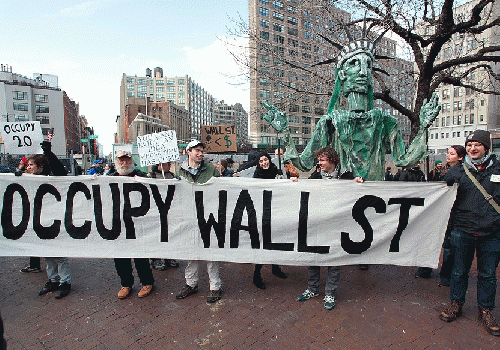The Occupy Wall Street movement (OWS) is searching for insight,
wisdom, and a sense of direction. These resources are available to us when we
turn inward to occupy our psyche.
In the absence of psychological insight, each of us to some degree is divided
from within. Also divided from within is the OWS movement itself, as Rolling Stone magazine reports in its
June issue ("The Battle for the Soul of Occupy"). The reform movement has a
neurotic undercurrent, and the prospect of its failure is real.
The struggle for progress is both an inner and an outer
process. As history has repeatedly shown, people create new frontiers of political
freedom as their sense of freedom develops from within. When we approach the
struggle for more inner freedom, we try to penetrate our resistance, defenses,
illusions, egotism, and the tyranny of the inner critic, all of which can
prevent us from being in charge of our own life.
Agitating and brainstorming, OWS reformers are searching
for keys to open doors to more freedom and justice. One key unlocks the mystery
of our psyche to reveal powerful forces of self-sabotage. Hidden in our psyche
is the astonishing fact that, behind our earnest protests, lurks buried secrets
of our unconscious connivance in failure and defeat.
We obviously need to reform an economic system that's
ravishing the planet. Yet we also need inner reform to overcome, among other
things, narcissism, fear, and self-doubt. The idea that we're all responsible
for human progress is very democratic. We are our nation's keepers. Renouncing that
responsibility only causes suffering in one form or other. Our striving also has
to proceed non-violently, or else we're just at war with ourselves. Understood
holistically, the one percent elite is simply the vanguard of the resistance to
personal growth that's in the psyche of us all.
OWS is about reclaiming public space. Inner work, too,
is about claiming space. We infuse our inner space with consciousness,
particularly the knowing of our goodness and value, as we expel conflict and
the dopiness of passivity or nonbeing.
Through inner development, we come to know what
constitutes true reform. In America, the Tea Party has ideas for reform that
differ considerably from those of OWS. This is why inner work is so important.
Consciousness planes away political jaggedness as it helps us to navigate
together. When we achieve personal growth by recognizing and resolving inner
conflict, we understand what true reform (or more evolved) living entails. We
see and appreciate more clearly the oneness of life and the conditions for
happiness--good health, simple pleasures, mutual respect, clear intelligence, along
with the joys of generosity. We can awaken the freedom from fear that is, in
part, the harmonious sensibility that giving of ourselves comes back around as
bounty and blessings.
OWS has an anarchistic spirit, which can be a positive
quality. I'm not an anarchist because, in possessing inner freedom, the concept
of anarchy gets no traction in my psyche. In other words, the anarchistic
position can be a defense that covers up an individual's unconscious affinity with
the feeling of being oppressed (which is the relationship so many people have
with their inner critic or superego). That said, inner work does have an
anarchistic spirit in the sense that it strives to establish an inner
authority, a radical freedom through which we deeply trust our own self to know
and express our best interests. However, civilized society still needs people in
authority. When we're evolved, the authorities also will come to be evolved. That's
when we stop projecting any lingering parental issues on to authority figures.
When we occupy our psyche, we recognize that greed,
callousness, stupidity, and self-defeat all emerge from our failure to
understand inner conflict. OWS is concerned that fat-cat capitalists are
hurting society, so let's look at greed as a byproduct of inner conflict. On
one side of this conflict, greedy people are anxious, even desperate, to
acquire more money and other benefits or at least to secure what they have. On
the other side, they live emotionally through the haunting impression that
something vital is missing or lacking in their life. They try to fill their
emotional attachment to this inner emptiness with worldly benefits and
egotistic gratification. Emotionally, they're stuck between their bloated egos and
their shrinking world, desperately seeking sanctuary in materialism and
illusions of superiority. They're neurotic men and women who, in stubborn fear,
could destroy democracy before relinquishing any of their privilege. We may be
required to sweet-talk them or guide them gingerly into the big tent of evolved
consciousness. Our impeccability would make the task easier.
With this understanding, we're less tempted to rage or
to resort to violence. A group within
OWS has been militant, engaging in illegal and sometimes violent acts in the
name of revolution. When we occupy our psyche, we are, in fact, attempting an inner
revolution (read, "The
Tyrant that Rules Our Inner Life" ). If we want to succeed,
we don't, of course, become violent toward ourselves. The violence of the
militants is pseudo-aggression, which, as a psychological defense, produces a
juvenile thrill that covers up their unresolved conflicts regarding feelings of
helplessness, passivity, and unworthiness. Helplessness is a strong emotion
that lingers from childhood. Our psyche reverberates with the clash of
passivity and aggression. Militants act out this conflict when they provoke the
police for the unconscious purpose of deepening their sense of oppression. They
have to be taught that their over-the-top aggression is a reaction to inner
passivity.
The dogmatic radicals of OWS are the most passive
members of the movement. They can't feel power without resorting to violence.
We want to reform our way of life not because we're in a rage at the one
percent (they are us and we are them) but because we're becoming, to our great
benefit, 100 percent.





